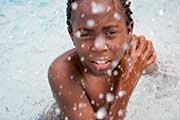Two cases show similar clinical course for young teens diving to about 25 m
MONDAY, Aug. 10, 2015 (HealthDay News) — Acute central nervous system complications can occur in children after breath-hold diving, according to a case report published online Aug. 10 in Pediatrics.
Stefani Harmsen, M.D., from the Heinrich-Heine University in Düsseldorf, Germany, and colleagues reported two cases of children with acute central nervous system complications after breath-hold diving.
The researchers describe one case of a 12-year-old boy who presented with unilateral leg weakness and paresthesia after diving about 25 m beneath the water surface. He felt extreme thoracic pain after ascent that resolved spontaneously. Right leg weakness and sensory deficits with a sensory level at T5 were revealed on neurologic examination. In spinal magnetic resonance imaging (MRI), a non-enhancing T2-hyperintense lesion was revealed in the central cord at the level of T1/T2, indicative of spinal cord edema. In a second case, a 13-year-old girl was admitted with acute dizziness, personality changes, confusion, and headache about 30 minutes after diving beneath the water for a distance of about 25 m. She felt sudden thoracic pain and lost consciousness after stepping out. She experienced headache, vertigo, and numbness of the left side a short time later. Reduced sensibility to all modalities, a positive Romberg test, and vertigo were reported in neurologic examination, with no pathologic findings on MRI.
“This condition has been reported for the first time to occur in children after breath-hold diving beneath the water surface without glossopharyngeal insufflation,” the authors write.
Copyright © 2015 HealthDay. All rights reserved.








